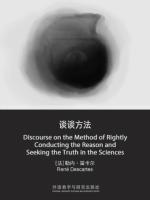Commendable brain-René
Discourse on the Method (1637) was René Descartes’ first published work. He wrote the book in French rather than Latin, the accepted language of scholarship at the time, because he intended to explain complex scientific matters to people who had never studied them before. Descartes spent much of his life in travel, studying the great works of philosophers and scientists. Although his philosophy was accepted by some, the majority of Holland found his works controversial and radical.
As with any other man who emerges with “enlightened” philosophy–new knowledge to the public, his work is not accepted by the majority at first. This method however, becomes the approach that many succeeding scientific minds adopt. As these scientists later implement these principles, they discover many scientific advances that greatly benefit society.
This classic is a great representation of the thought that was evolving during this time period, and is also representative work of the important link between metaphysical thought and objective scientific discovery. The Enlightenment was emerging, and the new approach was positivistic in scope–to verify everything with absolute fact. Descartes believed that only things sensed can be defined as real, even more particular, only things that can be reasoned are legitimate. In eyes of Descartes, even God is legitimized only to the degree that Descartes himself can sense and reason. The only way to know if something exists, Descartes argued, is that it can be measured. This is very significant because the emerging philosophy of all great minds of the time period, is that of scientific verification–of understanding the world through measuring, sensing, gathering, analyzing, and concluding. Through his study and thought, great advances may be made in the world as man discovers how to explain, and eventually control the things he can change; the physical things around him.
It was very interesting to read how Descartes went about finding truth in his own life. Although his singular use of reasoning led him to many important truths, it also resulted in a few false assumptions. His false interpretation about the mechanisms of the beating heart show us that even a man whose life and thoughts were devoted to the power of reason, cannot always make an accurate deductive interpretation of all the facts that surround him. Science in all its forms requires constant testing and refining.
Descartes also admits that his knowledge came not from divine bestowal, as he believed it had come to many of the other philosophers and scientists. His knowledge, he claimed, came from the reading of many great books, his education, and his travels abroad. And yet with all of his knowledge and reasoning powers, he humbly admits that the more he learned, the more he found he didn't know. This principle can be applied to all who don’t believe they have bestowed with intellectual treasures from God. Persistence and hunger for truth can lift any man to greatness.
(485 words)



 京公网安备 11010802032529号
京公网安备 11010802032529号